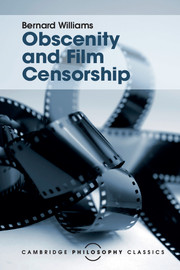4 - The situation
from Part 1 - Background
Published online by Cambridge University Press: 05 November 2015
Summary
4.1 We shall describe in this chapter the recent events and developments which created the background to our appointment, and also the present situation which our study revealed. The subject always attracts controversy and an obscenity trial or a censorship decision is likely to be exploited by the media for its public interest. But this interest undoubtedly fluctuates over the years and the controversy rages more fiercely in some periods than in others. It may be that our appointment owes something to the fact that the preceding years had seen more frequent and more heated discussion of the subject.
The retreat of the law
4.2 For many years the obscenity laws have been in retreat. The Obscene Publications Act 1959 marked, of course, a conscious decision that the obscenity laws were affecting material which should be free of legal restriction and that the boundary should be changed; and the acquittal of the publishers of Lady Chatterley's Lover in 1960, after extensive use of the newly-provided defence of public good, seemed to show that the Act had brought about the change that its sponsors desired. That decision represented one stage in the retreat of the law from the written word. Another was perhaps the controversial prosecution involving Last Exit to Brooklyn in 1967, where the publishers were convicted by a jury but the conviction was quashed on appeal. A further, perhaps final, stage seems to have been reached with the prosecution of Inside Linda Lovelace in 1976. It was the trial, and acquittal, of the publisher of Inside Linda Lovelace which generated the most publicity for the obscenity laws in the years immediately before our appointment, and the view was expressed to us by representatives of the Metropolitan Police that the failure of that prosecution meant that the law was unlikely to be invoked again against the written word. Their view (which appeared from his summing-up to have been shared by the trial judge) was that it was difficult to imagine what written material would be regarded as obscene if that was not.
- Type
- Chapter
- Information
- Obscenity and Film CensorshipAn Abridgement of the Williams Report, pp. 46 - 66Publisher: Cambridge University PressPrint publication year: 2015

